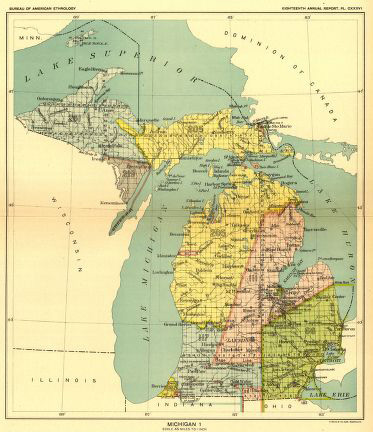Immediately the Michigan tribes had to enter into treaty negotiations with the United States in order to stay in their homelands. For the tribes, this meant ceding away millions of acres of ancestral homelands to avoid removal to Kansas and Oklahoma.
"It is a heart-rending thought to our simple feelings to think of leaving our native country forever, and which has been bought with the price of, their native blood." Augustin Hamlin, head Odawa interpreter for treaty negotiations

Bureau of American Ethnology, Smithsonian Institution
On multiple occasions immediately after the war, the Odawa petitioned the Government to hold councils regarding treaties. They also held councils amongst themselves and the Ojibway. The Odawa knew they must enter into a treaty agreement in order to secure lands in Michigan. In 1835, a delegation of Odawa leaders from Little Traverse departed on an uncertain trip to Washington D.C. in the hopes of creating a home for future generations of Odawa in northern Michigan.
On December 5, 1835, Odawa head man and interpreter for treaty negotiations Augustin Hamlin wrote this impassioned letter to Lewis Cass, then Secretary of War under President Jackson:
“The principal objects of our visit here, are these: we would make some arrangements with the government remaining in the Territory of Michigan in the quiet possession of our lands, and to transmit the same safely to our posterity. We do not wish to sell all the lands claimed by us and consequently not to remove to the west of the Mississippi...
“It is a heart-rending thought to our simple feelings to think of leaving our native country forever, and which has been bought with the price of, their native blood, and which has been thus safely transmitted to us. It is, we say, a heart-rending thought to us to think so; there are many local endearments which make the soul shrink with horror at the idea of rejecting our country forever—the mortal remains of our deceased parents, relations and friends, cry out to us as it were, for our compassion, our sympathy and our love.”
The result of that fateful trip and a subsequent return visit was the Washington Treaty of 1836. With the fear of removal, the pressure of a growing American population in Michigan and strong desire to stay in their homelands, the Odawa and Ojibway from northern Michigan agreed to the treaty. The United States Senate would have to ratify it and in addition, the Ogeemak (leaders) would not sign the final treaty until it was brought back to Michigan, where the respective Odawa and Ojibway communities could witness their leaders put their seals upon it.
The Treaty of 1836 ceded to the United States nearly 16 million acres of land in the Upper and Lower Peninsula. Reservation lands would be chosen within those ceded lands. Hunting and fishing rights, education, money and services were also important stipulations of the treaty. The treaty was by no means favorable to the Odawa and Ojibway. It was the best the tribes could do with tremendous odds against them.
Last updated: May 24, 2016
